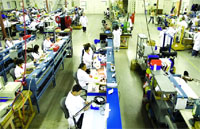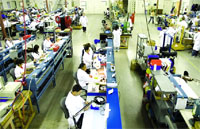
Making Connections
Wire and Harness Maker MicroTek Has Found a Niche in the Nonprofit Industry
MicroTek CEO Anne Paradis is holding up a plywood board. Its got markings on it every few inches and simple diagrams that show one where to tie and cut wires and add connectors. The straightforward visual system makes it easy for almost anyone to assemble a wire harness even someone who is learning-disabled.Fifteen of MicroTeks 110 employees have disabilities, and the board is one of the many techniques the company uses to train and integrate those employees into its work environment.
Based in Chicopee, MicroTek, which makes custom cable and harnesses, is part of the changing manufacturing sector in the Pioneer Valley. The company was founded 26 years ago with the sole purpose of providing a meaningful workplace for people with disabilities.
I wish I could tell you it was a story about market research, but it wasnt, said Paradis about how the company got its start in the cable business.
Indeed, it was really by chance that MicroTek ended up making wires instead of, say, protein bars or womens clothing.
It all started in 1983 when about a dozen human services advocates got together. They were working in conjunction with the University of Oregon, which was researching models for employing people who were difficult to employ.
One model was to start a company where one controls the environment, provides the training, and brings in the work. It seemed like a good idea. The group just needed something to produce.
Someone at the University of Oregon happened to have a connection to Hewlett-Packard, said Paradis. That person approached the company and said, we want to start up this company. Can you help us?
Hewlett-Packard agreed and, to get things rolling, gave the young company its first commercial contracts for wire harnesses. With the business elements in place, the founders went to the Department of Developmental Services to secure additional funding.
Once out of the gates, MicroTek ran into rough seas. While the company originally hoped to hire more disabled people, it quickly realized that if it wanted commercial success, it needed a broader skill set people who could solder, read blueprints, and so on and additional customers.
For this issue, BusinessWest looks at how it all came together.
Current Events
Make this company viable.
That was the assignment given to Paradis when she was first brought on board in 1987.
She started off working for MicroTek as a marketing consultant for a year, but when it was discovered that the companys problems were worse than anybody realized, the board of directors took her on as general manager.
I had a background in human services and a masters in business administration, Paradis explained. I didnt know anything about cabling.
She was about to learn.
When you are the general manager of a small business, you are doing everything, she said. I was doing the sales, the quoting. I was covering for other managers when they werent there. I worked long hours.
Getting new business wasnt easy. Paradis had to prove to potential customers that MicroTek wasnt simply a sheltered workshop and that it was capable of producing advanced assemblies to a consistent level of quality. A helping hand came again from its number-one customer.
Hewlett-Packard lent out engineering support to get us to the next level, Paradis said. Literally, engineers would come and spend the day with us troubleshooting problems, or we would go to their facility, and they would provide training. It was a real investment in our success.
In the 22 years that Paradis has been with MicroTek, she has helped grow the company from 30 to 110 employees and from $1 million in sales to $6 million. In 2001, after outgrowing the space it occupied in an old mill building in Chicopee Falls, MicroTek moved to its current location: a $1 million, 22,000-square-foot factory at 36 Justin Dr. in Chicopee.
MicroTek makes wire harnessing, cables, and, more recently, control panels for mainly security and medical companies. Its sweet spot is low- to medium-volume assemblies, meaning anywhere from five to 25,000 of a particular item.
Our costs are competitive, said Paradis. Some people would say our nonprofit status gives us an edge, but we actually have to work harder to stay competitive, because a learning-disabled person is only 40% to 60% as productive as someone who is not.
Working with people with disabilities has additional challenges as well, such as training. One has to be able to teach skills that a disabled person can generalize over a broad range of products.
Its easy to teach someone a specific job they can do over and over again, but its harder to teach them how to use one termination machine and then do that same operation on different types of terminals, said Paradis, referring to the machines that add connectors to the end of the wires once theyve been clipped. Another terminal might look or even feel different.
The other challenge is integrating disabled people with the rest of a company. Managers want them to work as productive members of teams and remove the stigma of being disabled, explained Paradis.
Thats where the layout boards come in. A disabled worker can lay the cables out on the board and follow visual cues to know where to cut without having to continually pull out a ruler to take measurements.
We made the layout boards for people with disabilities, but then started using them for everyone, said Paradis. Because whether you have a disability or not, the board lets you work with greater efficiency and fewer errors.
Slump and Rebound
Earlier this year, MicroTek began to feel the effects of the sluggish economy, albeit a little later than most manufacturers. It cut capacity and saw sales fall by 20%, and took a temporary workforce reduction in which staff was cut back to four days a week for two months and collected unemployment for the fifth day. Ten workers also volunteered to be laid off.
But all that has changed, with the company rebounding like gangbusters, Paradis said.
We experienced a sharp decline in spring, but sales picked right back up in July and August, and we rolled back all of the cost reductions, she noted. Now were ahead of budget projections for this year a turnaround that has her feeling more confident about the health of manufacturing in general.
Meanwhile, Paradis has taken on a new mission. Our focus has shifted outward, she said. Last year, the company launched an employment-demonstration project. Its now working with several local companies to help them train people with disabilities in-house using all-natural supports.
Paradis believes that bringing in outside trainers sets up artificial barriers between the disabled person and other people in the company, which keep them from forming relationships and integrating successfully.
If there is one lesson that MicroTek has to teach, its that diversity in the workforce is what makes companies stronger.





